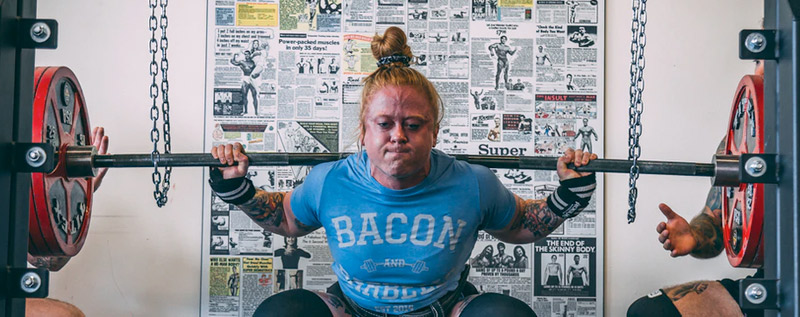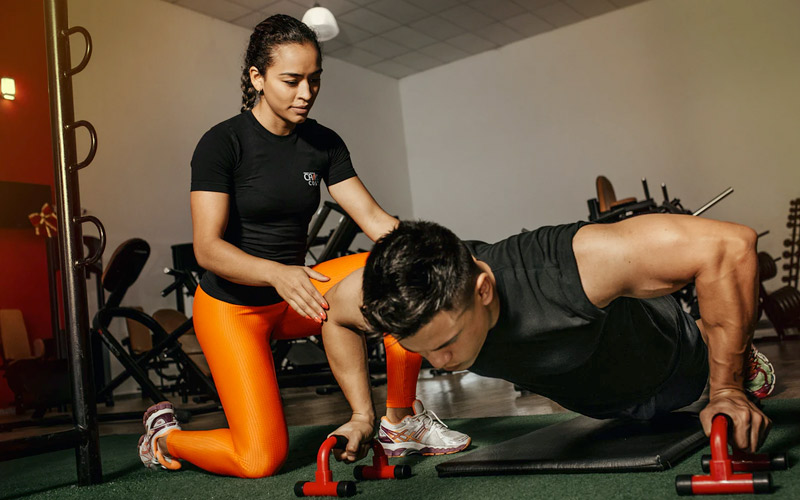Personal trainers can offer a number of very useful and valuable services, including help with nutrition for growing bodies, and helping ensure that you’re exercising with the proper form to get optimal results and to avoid injuries. Personal trainers for teenagers should cater their programs to teens in particular, because the needs of a teenager who just wants to learn the basics or get in shape are a lot different than an adult super-athlete who is looking to compete at the highest level of their sport.
See also: How to lose 10 pounds in a week for teens (Not what you think!)
Every city has examples of the best personal trainers for teenagers, and the worst ones. When you’re looking to hire someone, whether you’re looking to help propel a teen into a career of athletic success, or just a more basic and pedestrian fitness program, it’s good to find a trainer who is experienced in that specific area. A teenager who wants to be an Olympian has different needs than someone who is just looking to learn to eat a bit better and to get a good cardio routine down.
As such, a teenager who is training for high-level athletics is also usually in a position where they’re willing to push things a bit harder, and to accept the toll and the damage that can cause to the body. The trainer needs to recognize this, too. Somebody who is just looking to get in better shape should be doing things that are safe and take minimal toll on the body, whereas an aspiring athlete will have to push themselves a lot further and will require more specialized training.
What do personal trainers for teens do?
This really depends on what you’re training for. In general, and the unique program for any given teen will ideally vary as the trainer will create something to your needs, here’s a breakdown of some of the various things that they can help with:
Healthy habits
Not everybody grows up in a household where they’re able to learn the best habits when it comes to health. Healthy habits can include things like getting exercise on a regular basis, generally understanding which foods are good and bad, taking steps to keep your mental health in check, getting enough sleep, and more.
In the context of a trainer for kids and teens, it’s a good time to build and enforce healthy habits that you can grow up with and keep with you.
Nutrition
Beyond the basics of nutrition that might be covered in the healthy habits section above, trainers can come up with specialized diets. For example, if someone is trying to lose fat, or if someone is trying to lose muscle, or if someone is looking to train to run marathons, or if someone is trying to be a bodybuilder, and countless other examples, the correct foods to eat in a perfectly balanced diet can vary quite a bit. If someone is looking to do their best health-wise, without going over the top, but while still enjoying treats and indulgences, the plan will be very different than that of someone who wants to hit peak performance.
It’s not just about what you eat, but also understanding the essential vitamins that the body needs and when to supplement for things that may be lacking from the diet.
Conditioning
This is something that will apply more to performance athletes, when you start to look at exercise through this lens. Of course, everyone can do conditioning exercises, but generally this has more of an emphasis on improving performance, tracking various metrics and measuring the results.
Everyone should do some regular cardio work, and conditioning training just takes it a step further by customizing an intense exercise routine and workout program for their young clients.
Strength training
Building up strength has a lot more to it than simply getting jacked muscles. Being stronger is always a good thing, whether it’s for athletic performance, or just to have a higher metabolism and to process food better, to feel better, to have more energy, etc. A trainer who is teaching strength training to teenagers should understand the differences between teens and adults, and should put an emphasis on not causing any long-term harm to their client’s joints and so on.
Sometimes, instead of trying to lift huge amounts of weight, it’s a good idea to just start with a huge focus on the fundamentals and simply using body weight to get the movements down perfectly, then very gradually increasing the weight as the young clients get older and the muscle builds to help put less impact on the joints. At the end of the day, a safe environment is crucial for a lifetime of
Physical training can take a toll on the body, so a teen fitness program should preach safe workout habits, proper exercise techniques, and should enable someone to take what they’ve learned and shift towards individual training that they can keep up with for life. Training instructors are a mainstay for people who are competitively training for kickboxing, football, basketball, hockey, and any number of other competitive sports
Sports medicine
Trainer’s aren’t doctors, but there are areas of sports medicine that they should have at least a rough understanding of. Trainers for professional athletes, who work for teams, or who have very high prices and work with very high-end clients will be expected to be able to handle a bit more than a student at the local gym who works as a trainer for teens on the weekends or after class. This isn’t meant to diminish beginner trainers, and it goes without saying that any medical issues should be handled by doctors and people with the proper certifications. Some personal trainers will have greater qualifications and designations than others, that’s all. A personal trainer for teens who are just looking for basic stuff, to get in shape, to get some help with their workouts and diets won’t be required to have the same certifications as someone who is working with Olympic athletes, and they won’t charge nearly as much for their services either so it’s a worthwhile trade-off for most people.
Training Sessions for Martial Arts, Pilates, Etc
Whether the goals are to excel in martial arts, other sports, or just fitness goals for a healthy lifestyle, personal trainers for teenagers will often take on a mentorship role as well, and can teach virtues like hard work, respect, dignity, self-confidence, and more. These values are present in martial arts, other sports, and just generally in life.
It might seem that things like pilates, yoga, and other lower-impact activities are on the total opposite spectrum from something like martial arts, but frankly speaking – they carry a lot of the same virtues and lessons, take similar discipline to excel at, and are examples of group fitness that will be for for everyone from energetic juniors to stressed out seniors.
Psychology
An exercise psychologist is someone who can help with the mental side of things, however this is a type of training that applies more to serious high-level athletes, rather than the average kid who is looking to workout and train.
Movement Training
This is a style of training that has more recently been popularized by Conor McGregor in the mainstream, but movement coaching can be useful for all sorts of sports and activities from ice skating, gymnastics, football, etc.
How to Choose Personal Trainers for Teenagers Near Me

Aside from someone with a personality that you get along with and who seems like someone you’d want to spend training time with, there are some more tangible things that can help you find a qualified trainer for yourself or for the teenager in your life, depending on who is reading this right now! Either way, the advice is the same.
Certified Personal Trainers for Teens
Find out what the local certifications are in your area, find out what it takes to get those certifications, and then see which tier of trainer is a good fit for your needs. In some places, anyone can just start calling themselves a trainer, so understanding the certifications and what’s involved in the process will help you determine how much that matters to you. It’s entirely possible that someone who has been training themselves and others for decades will be better informed and educated than someone who is just starting, even if the latter is more “certified”, but at the end of the day it’s a good idea to stick with people who have bothered to get the proper certifications and who have proven at least a base-level of competency in the field.
Experience With This Age Group
A trainer who works with teenagers, and advertisers their services as such, should have experience in the specific needs and cautions to take with teens.
Child Abuse Registry Check
Depending on where you live, you may be able to do a check against various abuse registries to ensure that the person you’re thinking of hiring doesn’t have a checkered past when it comes to working with people in this age group. It’s terribly sad to have to think about, but sometimes positions of coaching or training can attract the types of people who would want to be in a position of power, and to spend time in isolation, with people of this age group. These checks are often required for people who want to apply for jobs in daycares, at schools, and other places where they will be working with youth, so it’s not totally out of left field to want that if they’re going to be working with your kids or teenagers for training services.
CPR Certification
CPR and basic first-aid classes are important, you want to hire a trainer who is going to know how to react in the event of an emergency like if you faint, or if you get your foot crushed by a falling plate, or if you start to have a seizure, or a number of other things that can happen when you’re pushing your body hard. It’s not hard at all to get CPR certification, so a trainer who doesn’t have that, simply hasn’t bothered to do it, and that’s a bit of a red flag.
Benefits of Personal Training for Teenagers
As we’ve said a handful of times already, personal training can be useful even if you aren’t planning on competing athletically or even if you’re already in good shape.
Studies have shown that a child who is obese between the ages of 10 and 13 has an 80 percent chance of becoming an obese adult. (typeatraining.com)
The above figure demonstrates that getting an early start on fitness and healthy habits can help shape the rest of a person’s life, from their teenage years to adult hood. The teen years are a really good time to lose weight if you were an overweight child, and it can help save you from being obese later in life.
Academics Studies show that active kids perform better academically Research has shown that after 30 minutes on the treadmill, students solve problems up to 10 percent more effectively. (typeatraining.com)
Living an active lifestyle earlier in life, especially with a bit of professional guidance, can have a profound impact on one’s studies. Solving problems 10% more effectively might not sound like a lot in the grand scheme of things, but if you extrapolate that a bit to other areas of life, problem solving in general, and all of the other positive benefits – it can work exponentially to have a profound impact.
